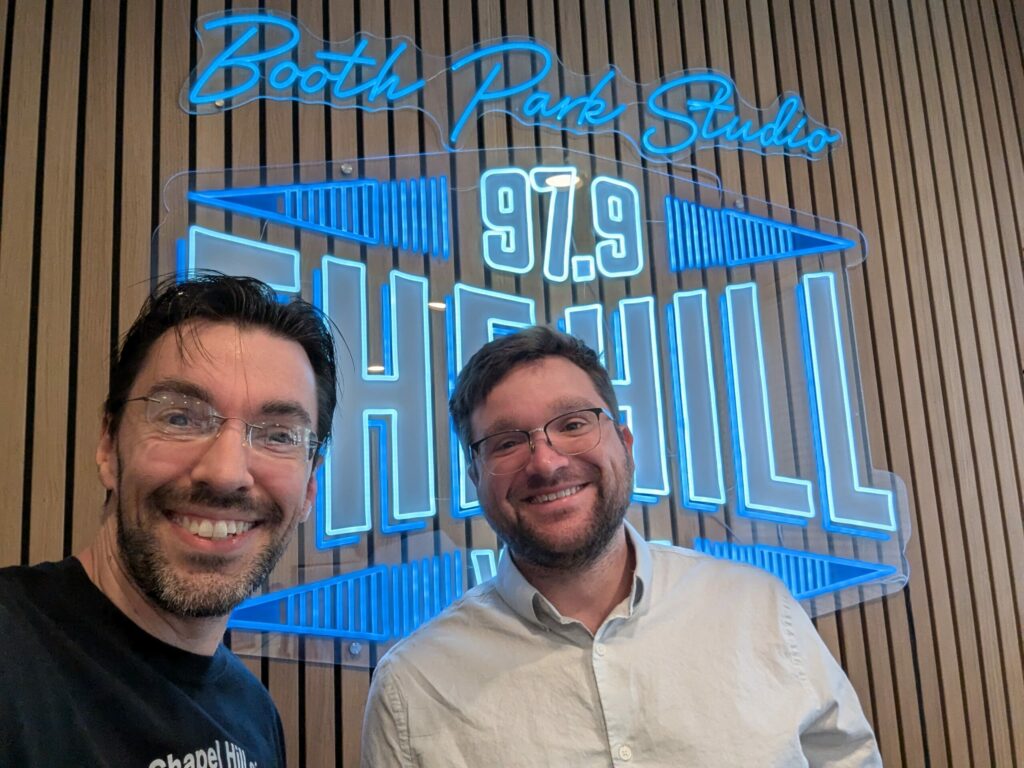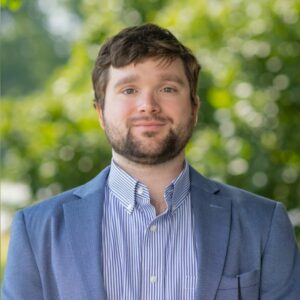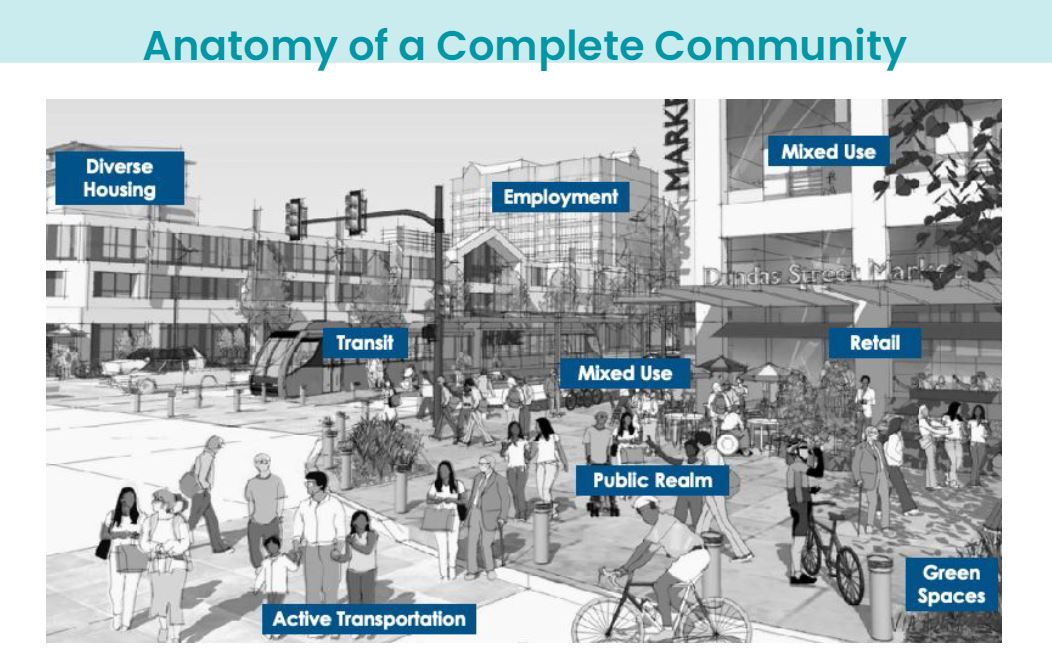
Welcome to “A Vibrant Chapel Hill, Today and Tomorrow!” a monthly interview series with Chapel Hill’s Economic Development Office, exclusively on 97.9 The Hill WCHL & Chapelboro.com. Every month you will get updates from department staff and learn about initiatives the town is taking to ensure a Vibrant Chapel Hill, Today and Tomorrow.
This month’s guest: David Putnam, Economic Development Director for Town of Chapel Hill.
Listen to the full conversation with Aaron Keck or read the transcript below, which is lightly edited for clarity.
Aaron Keck: We are joined by David Putnam, who is Chapel Hill’s brand new economic development director. Big move for the town coming over from Alamance County where he headed up economic development. David, thank you so much for being with us today. Good morning.
David Putnam: Well thank you for having me. I’m looking forward to the interview.
Keck: Tell us about yourself, other than the fact that you were in Alamance before, what should folks know about you?
Putnam: I guess I’ll start from the beginning. I grew up in Raleigh, so I’m kind of a Triangle native. After high school I tried to get as far away from the family as possible, while still being in the state. So I went to App State for my undergrad. And I earned my undergraduate degree in Parks and Recreation. Slowly I’ve been migrating my way back closer to the Triangle, and now I’ve made it. I’m in Chapel Hill. I’m excited to join such a vibrant town and community and contribute to its vibrancy.
Keck: What drew you to the position in the first place?
Putnam: For me, it was the opportunity to make an impact in such a creative space, such an innovative area, and to build upon the great work that folks like Dwight (Former Chapel Hill Economic Development Direct Dwight Bassett) had done in the past., And from Alamance I was able to see the momentum and the progress being made in Chapel Hill, and the opportunity rose up. I looked at it as a once in a 16-year opportunity because that’s about how long Dwight was here, so I jumped for it.
Keck: It’s a big change. I’ve been here for 14 years now, and Dwight Bassett has been the Economic Development Director this whole time, so that’s right. Big, big shoes to fill. How have the first few weeks been so far?
Putnam: It’s good. My calendar is absolutely stacked. I haven’t had a free moment.
Keck: You know, they say this is the summer lull too.
Putnam: Yeah, that’s right. We used to have a joke in my old workspace where we’d say July is slow, and then every July it would be just cram packed with meetings and things. If this is slow, I cannot wait to see what happens in September and August.
Keck: What are your chief goals coming into the role? What do you want to achieve?
Putnam: Love that question. We already have a bunch of active projects I think folks are familiar with, but in my three weeks of having informational interviews and collecting people’s opinions, the community’s thoughts, other department’s thoughts, the non-government organization thoughts, I’ve come up with five priority areas that I think our department is going to be working towards over the next few years and, and hopefully build upon all the planning efforts that have occurred within the town, within the community, with our local partners and so on. Those five priority areas are product and posture, working on ourselves, our competitive advantage within the town as we try and remain competitive in a global market and economy, community partnerships. That’s huge. These are things like working with EMPOWERment, working with The Chamber, working with you all (97.9 The Hill WCHL & Chapelboro.com.) We are going to be really focused on partnering with local community members, organizations, and initiatives. I should say that means cross jurisdictional as well, working on interlocal types of opportunities. The next priority I would say is going to be existing business services and support. Really looking at, do we have a dedicated program and initiative here to tailor support for the local community and the businesses. Everything from entrepreneurs to established businesses, to start-up businesses, to folks that want to grow and expand in Chapel Hill and making sure that we can accommodate their needs.
Keck: Yes, That’s such a big one because we think about economic development as bringing new business in, but it’s also all about the great businesses here now that need support too.
Putnam: I always like to say, and I think I picked this up from an old colleague of mine in the Piedmont Triad, Kevin Franklin, he heads up Randolph County economic development, they had that big win with Toyota, but his background is existing industry services, and he’s always told me that for existing industry services, business support is the most important thing that we do. And I couldn’t agree more. It is the most important thing that an economic development office can do. Priorities four and five include real estate and projects. Looking at what our real estate diversity is in Chapel Hill. Are we accommodating what the market needs? Are we working on new product that can be developed to fill the market’s needs? And then our active projects, we’re working on things like the streetscape plan, a lot of downtown initiatives, trying to thread the needle on a few complete community strategies and so on. And then finally, and I should also add, these are in no certain order, they’re not prioritized by any means, but access to opportunities, that’s everything from access to capital, access to resources, access to economic mobility opportunities. Simply making sure that “access” is reachable for everybody and everything that comes to Chapel Hill.
Keck: You mentioned product and posture up top. What do you think the posture or the product should be for Chapel Hill? Because one of the big challenges, I have to assume, and we figured this out if we didn’t know it before during the pandemic, the economic landscape can change so quickly. You have to be super flexible because we don’t know 10 years from now what people are going to demand or want or need.
Putnam: That’s a good point. I’m still learning this local market and how it’s positioned and what its needs are. But from my work in Alamance, I can say much of the I-85 corridor has been overbuilt, pre-pandemic and post pandemic. That was kind of the general consensus. Now we’re a little splintered off the I-85 corridor here. We’re nestled closer to RTP and I-40. So I think we have office products that have a good fit for the market. One space I’m really interested to get more research around is how we can further accommodate RTP’s need for wet lab and innovation space. And I think that’s an area that Chapel Hill, on the outside looking in, I’m still obviously learning the landscape, but I think that’s an area that we can thrive. We have such great innovation coming out of UNC-Chapel Hill, out of the town, out of the entrepreneurs here. I think more innovative spaces, more innovative products, and balancing the mixture of what Chapel Hill needs. Are we addressing all of the real estate spectrum? Do we have enough multifamily? Do we have enough single-family? Do we have enough business commercial retail spaces? I’m interested to find out more about what that means for Chapel Hill.
Keck: Now last point is important too. Because again, you think about economic development, it’s focusing on businesses, but it’s also the infrastructure to support the businesses, which means transportation and housing and everything else.
Putnam: That’s right.
Keck: What else should folks know about economic development initiatives and plans and goals for the coming weeks and months?
Putnam: Stay tuned. I think we’re going to have a lot of opportunities for folks to engage with the economic development department, the things that we’re doing. There are things that the town is doing to help folks engage that are really important and exciting. My wife calls me the Leslie Knope of Economic Development.
Keck: You had your start with Parks and Rec. So this makes sense.
Putnam: I did. In Parks and Rec. So I’m very civically focused. I love being out in the community, don’t ever hesitate to come up and ask me what’s going on. If it’s not confidential, if it’s something I can share, I’d be happy to. But I would also say economic development is the ultimate team sport. We can only go as far as all of our partners, coming together and helping us reach that north star that we set. So I think it’s going to be an exciting journey that I’m about to undertake with the town, with the community. I can’t wait to learn more. And don’t be strangers.
Keck: Looking forward to having you back many more times in the future. David Putnam, thank you so much for being with us.
Putnam: Well thank you.




